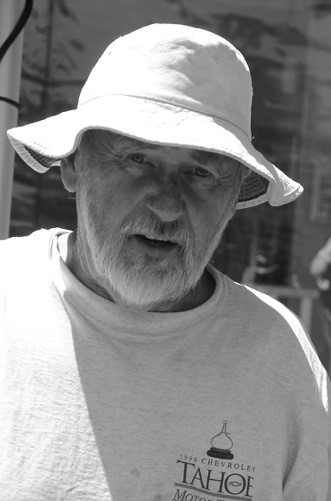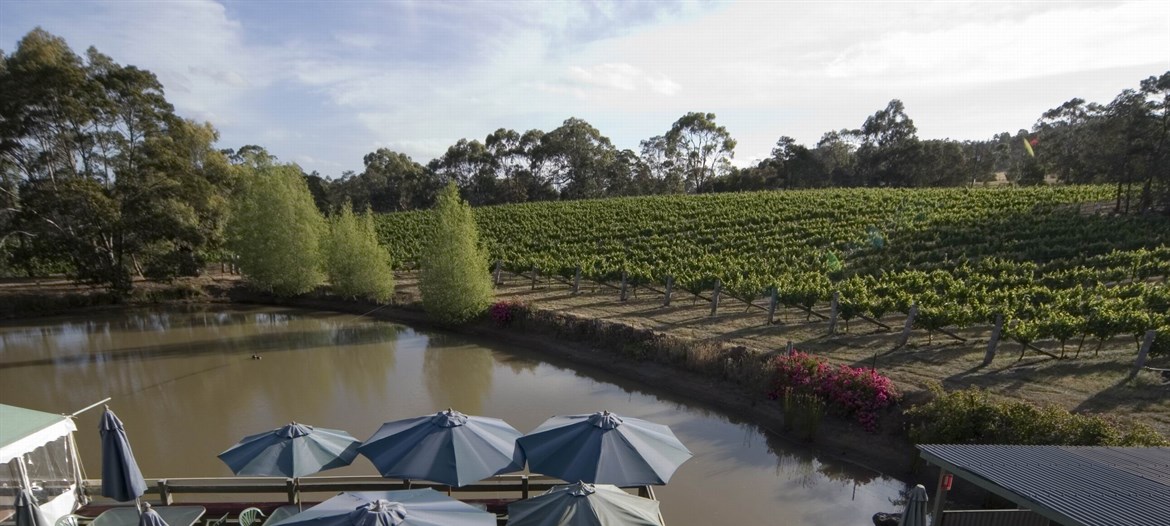
Why did you become a vigneron? It is in the vineyard where the seasonal changes make life interesting and the challenge of each season exciting. Hands in the earth, the smell of rain, the brilliance of sunshine, the dread of disease and the satisfaction of a well ripened, healthy, full flavoured grapes at the end of the season is what I love. The end product is a harvest that promises to make an exceptional wine that I will enjoy drinking myself, sharing with friends and family and then selling it to the public for their enjoyment is why I became a vigneron.
What do you look for when you make wine? I don’t make wine – I grow grapes. What I look for is health and hardiness. I am very involved in the end product of the winemaking process, however. I like clean, lightly oaked wine that reflects our own tastes and reflects the decidedly cool micro-climate at our property, 535 meters above sea level.
How do you know when you’ve got a good vintage? I have been growing grapes on this property since 1978. I was the fourth grape grower in the region. Experience is everything. I know this property, I know the telling signs of a good year, the rainfall records that have been kept for 30 years, the soil that has been cultivated, prepped, honed and improved for 30 years, the tell-tale signs of the grape-vine leaves, the smell of the place, the look of the canes – all goes into the micro-computer called ‘my memory’, and my memory plays a big part in knowing when I have a good crop!
What do you like best about your site? The site is challenging in that it is at such a high elevation (535 metres), but also has many advantages such as gentle slopes to drive away any frost prospect, the catchment basin and springs that have for the most part of the last 37 years sustained our two dams, the proximity to the township of Gisborne which is now the source of our recycled water (no more drought fears!), the relatively close proximity to Melbourne that gives us a source of customers for our wine.
What do you like best about your plants? Each plant has been put in the earth by me. Named? Not quite, but every plant is a loyal friend that does its best every year to produce top quality grapes.
What is the most difficult aspect of making wine? Not being in control – it’s a matter of trust for us. The Ellis family have been making our wine since 1991 – a long time. During that time a relationship of trust has evolved but even more important, they know our style. We taste and test the wine before bottling to ensure that it is what we want and can sell and is of a standard that we are proud of. It is difficult to not be in control, but as I said – it’s a matter of trust.
What is the most difficult aspect of grape growing? Time! As a part-time viticulturist I wish that I was always available when the plants need me most. Sometimes that is possible, sometimes it is not. With the supply now of recycled water the fear of drought and the uncertainly of sustained water available is gone. So that is a real relief.
What is one aspect of your job/winery/vineyard that might surprise people? I love the mental relaxation that grape-growing provides me with, the contrast to “the day job” is a great harmoniser of my life.
What is your favourite wine that you’ve made and what makes it your favourite? Favourite: 2003 Pinot Noir. Out of adversity comes great things, and this drought year of 2003 proved it. Full bodied, rich, peppery, bold – but unfortunately, not enough of it!
Does one year or one vintage come to mind when you think about one of the best Pinot Noirs/Chardonnay/Riesling/GV etc…that you’ve made? See above! Also, 2012 has proved to be a very good Pinot year. 2010 and 2013 have produced us exceptional Chardonnay.
For people who want to know more about winemaking or grape growing what would you recommend they do (ie books, magazines, trips etc)? Join our Adopt-a-Vine program. Adopt-a-vine is designed to allow the average person to get involved in the vine-to-wine process. They get involved in seasonal vineyard activities such as crop estimation, canopy management, pruning, spring preparation and picking. They get their hands dirty, they get to understand the equipment used, the decisions that have to be made, the reasons why each vineyard looks different, and lots more.
Tell us about the harvest process? Get the grapes off when ready, load the truck, pray the truck doesn’t break down on the way to Hanging Rock Winery, hope it gets up the hills, unload, return home, scrub up, have dinner and be thankful (or not) until the next varietal is ready to come off.
And how long does that process take? We pick a single varietal in a day with contract labour and the labour of love from our Adopt-a-Vine members.
What is the best time of year to visit the Macedon Ranges? Vintage – Autumn with its beautiful colours and warm soft sunny days counter-balanced with cool nights that bring with it the culmination of a year’s work.
What is it that makes growing grapes and/or making wine from the Macedon Ranges special? Small crops means that every grape counts, even the biggest of our wineries are still only boutique by general measures. Knowing that my wine is going to be unique, small batch, special wine like no one else’s. Being part of the Macedon Ranges region means that there is a certain culture to our winemaking – all of the things that our branding statements state. We should be proud of growing grapes and making wine in such an exclusive region, one known for its quality and high standard of wines.
Some facts and figures about the winery:
What is the Name of your winery or vineyard? Gisborne Peak Winery
What kinds of varietals are grown at your winery or vineyard? Chardonnay, Pinot Noir, Riesling, Semillon, Lagrein
What is the % split between these varietals as a whole? Chardonnay = 40% Pinot Noir = 40% , Semillon = 10%, Riesling = 8% , Lagrein = 2%
What is the winery’s average yield of harvest grapes per acre? Sometime, fingers crossed, god-willing, everything right, 1.5 tonne per acre

